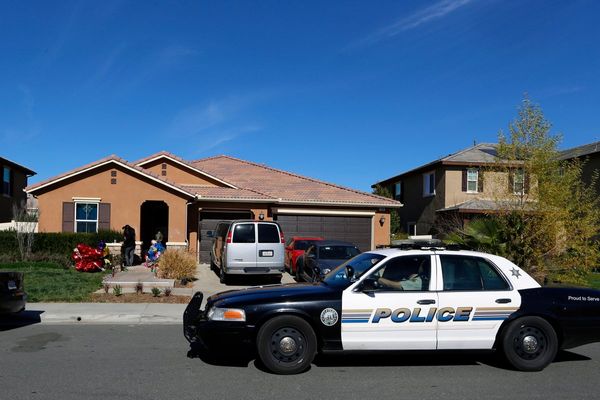SACRAMENTO, Calif. — Gov. Gavin Newsom's sweeping proposal to provide court-ordered treatment for homeless Californians struggling with mental illness and addiction passed the Legislature on Wednesday after lengthy debate that ended in overwhelming approval of the plan.
Newsom unveiled the Community Assistance, Recovery and Empowerment (CARE) Court framework in March as an innovative tool to treat and house thousands of people who have some combination of homelessness, substance use and severe mental illness.
"Today's passage of the CARE Act means hope for thousands of Californians suffering from severe forms of mental illness who too often languish on our streets without the treatment they desperately need and deserve," Newsom said in a statement after the final vote on SB 1338. "With our partners, we'll make CARE Court a reality, giving hope to not just those suffering with severe, untreated mental illnesses with psychosis, but also offering a lifeline to the friends and family members of these individuals who for too long have felt hopeless in getting help for their loved ones."
Families with loved ones who might qualify for a CARE plan celebrated the proposal, Senate Bill 1338, while civil liberties groups and disability advocates fiercely lobbied against it.
Lawmakers across the political spectrum have for months raised questions over the funding, infrastructure and workforce available to successfully implement CARE Court but in the end decided that solving California's homelessness and addiction crises warranted the bold approach.
"This is a phenomenal start. But it's just the beginning of real policy, of real solutions, to address our homelessness crisis," Assembly member Suzette Martinez Valladares, a Newhall Republican, said during a debate Tuesday. "This bill is great, but we need resources for the programs, for the services, for the workforce, that (don't) currently exist."
The Assembly approved the measure 62-2 after more than 30 minutes of discussion, and the Senate sent it to Newsom with a final 40-0 vote, unanimous approval.
"This is a new good beginning, a new path forward to be able to serve some of the most vulnerable Californians," said state Sen. Susan Eggman, a Stockton Democrat. "We have a crisis. Everybody knows it. It's no secret from anybody, and this is yet one more way to be able to address it with true professionals and everybody engaged at the table."
Proponents of CARE Court describe it as a voluntary alternative for those cycling in and out of incarceration and hospitalization due to their conditions or who are on track to land in a more restrictive court-ordered conservatorship. Newsom estimates that the system will serve 7,000 to 12,000 of California's most vulnerable residents.
CARE Court focuses on those with diagnoses of schizophrenia or other psychotic disorders. Not every participant would have to be homeless to qualify, but would need to be "unlikely to survive safely in the community without supervision" or have a condition that, without intervention, could deteriorate into relapse or serious harm to themselves or others.
To initiate a CARE plan, family members, first responders, medical professionals and behavioral health providers, among others, would petition a civil judge to determine if the person meets the criteria. If so, the court would initiate a series of hearings and evaluations to determine an individualized treatment plan.
Newsom has called CARE Court a "paradigm shift" that differs from mandated treatment because it was crafted to ensure that participants have autonomy in their recovery. Throughout the process, participants will have a clinical team, an attorney and a volunteer supporter they can choose as their personal advocate to explain the options available and help make decisions.
A CARE plan would, for up to two years, provide adult participants with medication, treatment and social services for stabilization and prioritize them with the appropriate housing for their level of need.
Local governments and officials from California's most populous cities quickly endorsed CARE Court, hailing it as a new way to combat homelessness at a time of increasing crisis. Twenty-three percent of California's 151,000 homeless residents have a severe mental illness, according to a 2021 analysis of census data by the Legislative Analyst's Office, and 17% have a chronic substance-use disorder.
Opinion polls this year showed that one of Newsom's greatest political vulnerabilities was the intensifying levels of homelessness and drug addiction throughout the state, which adds greater pressure for CARE Court to be successful and live up to what advocates hope will be a game-changing solution.
In a statement of support for SB 1338, San Diego City and County called CARE Court a "thoughtful approach to addressing the behavioral health crisis we are witnessing on our streets" and a way to get individuals "connected with the care they need earlier."
But county representatives, who would be responsible for setting up the system and would face thousands of dollars in fines for poor execution, for months called on Newsom to add more money to the budget to implement the proposal and to consider a staggered implementation.
Newsom's administration eventually agreed to roll out the policy in two waves: Glenn, Orange, Riverside, San Diego, San Francisco, Stanislaus and Tuolumne counties are required to set up their systems by Oct. 1, 2023, and the rest of the state's counties by Dec. 1, 2024.
The governor also authorized $63 million to assist local governments and courts with implementation and, more broadly, included $14.7 billion in his budget over the last two years for solutions to homelessness. That includes $1.5 billion available for so-called bridge housing, temporary shelter for vulnerable homeless people with behavioral health concerns.
The amendments failed to assuage concerns raised by the American Civil Liberties Union, Disability Rights California and other groups, which have argued throughout this year's legislative session that CARE Court would criminalize homelessness and disproportionately target Californians of color. Their opposition often made matters uncomfortable for the Democrats who are normally aligned with the groups on similar issues but ultimately supported CARE Court.
"A different proposal could have been actually allocating a lot of money toward housing, affordable housing, and to further bolstering mental health and social services, which are actually the things that would be helpful to people experiencing houselessness and people experiencing mental health issues, and to the people who love them," said Brandon Greene, director of the racial and economic justice program at the ACLU of Northern California.
Newsom has until Sept. 30 to sign the bill. He is expected to do so.
———







